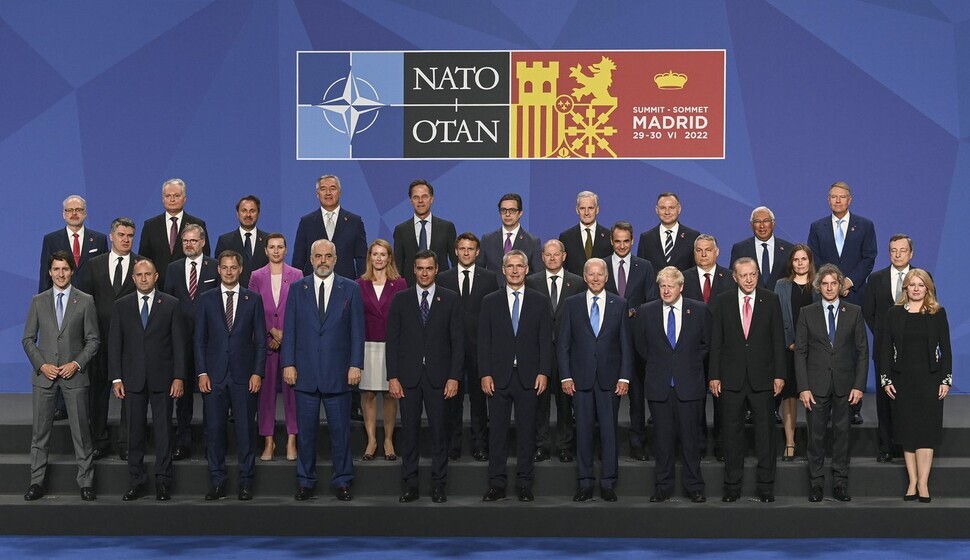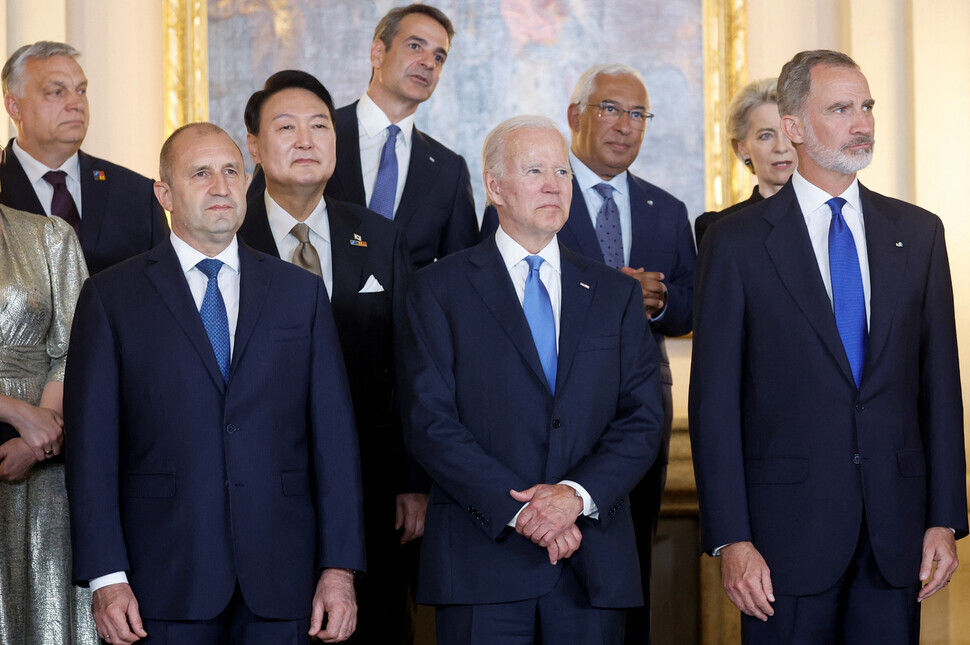hankyoreh
Links to other country sites 다른 나라 사이트 링크
Partners, not competitors: China protests NATO attempts to label it a “challenge”

China is fiercely protesting attempts by the North Atlantic Treaty Organization, or NATO, a US and European security alliance, to define it as a “systemic challenge.”
As its strategic rivalry with the US intensifies, China would find its room to maneuver severely constrained if Europe assumes a stance of clear opposition.
On Tuesday, Beijing made use of numerous diplomatic channels to denounce the moves by NATO.
“China and Europe are partners rather than competitors, let alone systemic rivals,” State Councilor and Foreign Minister Wang Yi was quoted as saying.
“China will continue to follow the path of peaceful development, and develop new systems for a higher-standard open economy,” he added.
Noting that “some differences between the two sides also affect the sound development of China-EU relations from time to time,” he stressed that “the EU should form a more objective and correct perception of China’s development direction.”
Zhang Jun, China’s permanent representative to the UN, said Beijing “pays close attention to NATO strategic adjustment,” and is “deeply concerned about the policy implications of its so-called ‘Strategic Concept.’”
In a regular briefing Tuesday, Chinese Foreign Ministry spokesperson Zhao Lijian said, “NATO’s so-called new Strategic Concept is just ‘old wine in a new bottle.’”
“It still has not changed the Cold War mentality of creating imaginary enemies and bloc confrontation,” he added.

Commenting on the new strategic concept at a Monday press conference, NATO’s secretary general said the organization would “address China for the first time, and the challenges that Beijing poses to our security, interests, and values.”
Meeting with reports on his aircraft en route to Spain from Germany on Tuesday, White House national security advisor Jake Sullivan said the strategic concept would “speak very directly and in a clear-eyed way to the multifaceted challenge posed by the People’s Republic of China.”
A key document laying out the values and objectives of NATO as a military alliance, the updated strategic concept is being finalized at the June 28-30 NATO summit in Madrid.
Bloomberg quoted numerous sources as saying that NATO’s use of the term “systemic challenge” indicated feelings of alarm toward Beijing. The characterization of China as a “challenge” — after no previous mention of it in the 2010 strategic concept document or anywhere else since NATO was established in 1949 — must be seen as a major shift in the security policy approach it has maintained for the past seven decades.
After the summit officially kicked off on Wednesday, NATO leaders began discussing how to respond to Russia, which recently invaded Ukraine, and to China, which has been aligning itself with Russia.
While China has been regarding its strategic rivalry with the US as unavoidable since the 2010s, it has been striving to stay on harmonious terms with Europe. It has been focusing its energies on improving relations, including the signing of Belt and Road Initiative agreements with 16 Central and Eastern Europe countries, starting with Hungary in 2015.
Chinese Premier Li Keqiang established the “16+1 cooperation” framework for regular meetings between China and 16 European countries, aimed at reaching agreements on stronger cooperation and people-to-people exchanges in the areas of energy, distribution, infrastructure, and finance.
But seven years later, the approach has been yielding little in the way of results due to factors including Beijing’s tepid response to the COVID-19 pandemic and the Russia-Ukraine war.
By Choi Hyun-june, Beijing correspondent
Please direct questions or comments to [english@hani.co.kr]

Editorial・opinion
![[Editorial] Penalties for airing allegations against Korea’s first lady endanger free press [Editorial] Penalties for airing allegations against Korea’s first lady endanger free press](https://flexible.img.hani.co.kr/flexible/normal/500/300/imgdb/original/2024/0502/1817146398095106.jpg) [Editorial] Penalties for airing allegations against Korea’s first lady endanger free press
[Editorial] Penalties for airing allegations against Korea’s first lady endanger free press![[Editorial] Yoon must halt procurement of SM-3 interceptor missiles [Editorial] Yoon must halt procurement of SM-3 interceptor missiles](https://flexible.img.hani.co.kr/flexible/normal/500/300/imgdb/child/2024/0501/17145495551605_1717145495195344.jpg) [Editorial] Yoon must halt procurement of SM-3 interceptor missiles
[Editorial] Yoon must halt procurement of SM-3 interceptor missiles- [Guest essay] Maybe Korea’s rapid population decline is an opportunity, not a crisis
- [Column] Can Yoon steer diplomacy with Russia, China back on track?
- [Column] Season 2 of special prosecutor probe may be coming to Korea soon
- [Column] Park Geun-hye déjà vu in Yoon Suk-yeol
- [Editorial] New weight of N. Korea’s nuclear threats makes dialogue all the more urgent
- [Guest essay] The real reason Korea’s new right wants to dub Rhee a founding father
- [Column] ‘Choson’: Is it time we start referring to N. Korea in its own terms?
- [Editorial] Japan’s rewriting of history with Korea has gone too far
Most viewed articles
- 1Months and months of overdue wages are pushing migrant workers in Korea into debt
- 2Bills for Itaewon crush inquiry, special counsel probe into Marine’s death pass National Assembly
- 31 in 3 S. Korean security experts support nuclear armament, CSIS finds
- 4Trump asks why US would defend Korea, hints at hiking Seoul’s defense cost burden
- 5[Reporter’s notebook] In Min’s world, she’s the artist — and NewJeans is her art
- 6S. Korea discusses participation in defense development with AUKUS alliance
- 760% of young Koreans see no need to have kids after marriage
- 8[Editorial] Penalties for airing allegations against Korea’s first lady endanger free press
- 9[Column] Can Yoon steer diplomacy with Russia, China back on track?
- 10Vietnamese war victims speak of sexual violence by S. Korean troops for the first time